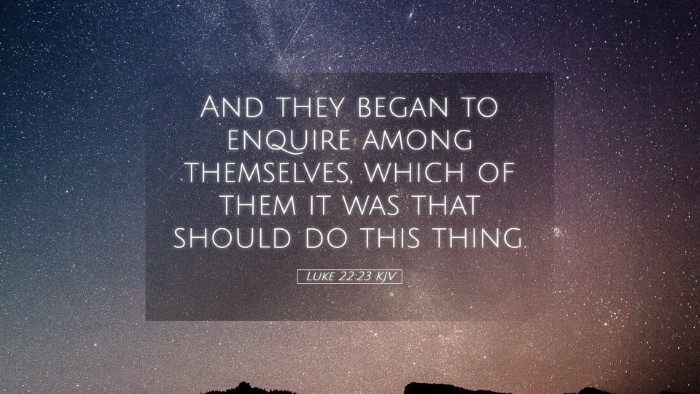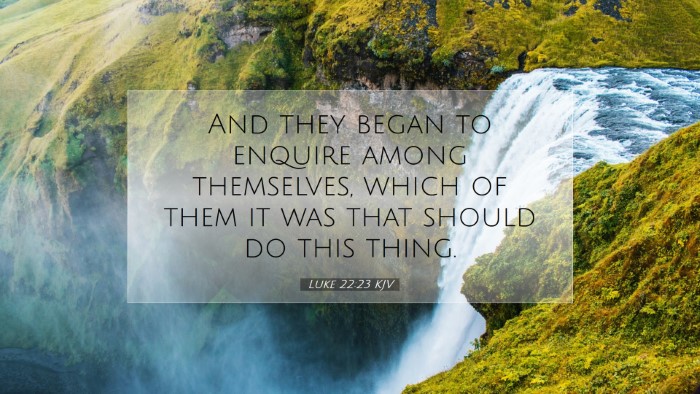Commentary on Luke 22:23
Verse Text: "And they began to question one another, which of them it was that should do this."
Introduction
In this brief verse, we observe a profound moment during the Last Supper, where the disciples grapple with the revelation that one among them would betray Jesus. This commentary synthesizes insights from esteemed public domain theologians, including Matthew Henry, Albert Barnes, and Adam Clarke, to explore the theological significance, historical context, and practical applications of this pivotal moment.
Contextual Understanding
This verse occurs in a critical narrative surrounding the institution of the Lord's Supper. It is essential to understand the historical backdrop of betrayal within the context of Jesus' impending crucifixion and the tension among His disciples.
Historical Background
Matthew Henry highlights that this supper was not merely a meal but a significant event filled with deep emotions, as it marked the transition of the old covenant to the new through Christ's imminent sacrifice. The atmosphere was charged with anticipation and sorrow, knowing that Jesus would soon face the cross.
Literary Context
Albert Barnes emphasizes that this inquiry among the disciples reflects the humility and self-examination necessary within the body of Christ. Instead of immediately identifying the betrayer, they turn inwards, questioning their own hearts. This introspection sets a tone of serious reflection.
The Implications of Betrayal
The fact that one of Jesus' closest followers would betray Him raises significant theological queries. The dignity of fellowship and the pain of betrayal coexist in stark contrast.
The Complexity of Human Nature
Adam Clarke observes that this moment exposes the frailty of human nature, even among those chosen to walk closest with Christ. It prompts us to consider how easily motives can be corrupted, challenging us as believers to remain vigilant against disloyalty in our own lives.
Divine Foreknowledge
Both Clarke and Henry assert the importance of recognizing God's sovereignty and foreknowledge in this scenario. Jesus, aware of the impending betrayal, demonstrates the plan of redemption unfolding through human actions, even sinful ones. This doesn't excuse the betrayal but illustrates God's ability to bring good out of evil.
Examining the Disciples' Response
The disciples' inquiries illustrate a natural reaction to betrayal—a mixture of shock, disbelief, and introspection. This response invites a closer examination of personal accountability and the nature of community.
The Call to Self-Examination
Henry reminds us that the question "Is it I?" is central to Christian humility. Each disciple's pondering of their own hearts serves as an invitation to all believers to consider their loyalty to Christ and the potential areas of betrayal in their own lives.
The Role of Community
The communal questioning reflects the disciples' bond. Barnes notes that within the body of Christ, there is responsibility to hold one another accountable. This moment encourages leaders and laypersons alike to create environments where mutual encouragement and correction can thrive.
Theological Insights
The theological ramifications of this passage are wide-ranging, proclaiming truths about sin, grace, and redemption.
Understanding Betrayal
The betrayal signifies more than a mere act of treachery. It serves as a representation of sin's intrinsic nature, emphasizing mankind's propensity to turn away from God. Clarke argues that betrayal stems from neglecting one's devotion, despite being in close communion with Christ.
Hope Despite Betrayal
Additionally, Henry beautifully illustrates that while betrayal represents great sin, it simultaneously highlights the enormity of God's grace. The very act intended to thwart God's plan became the means of salvation—a testimony to the mystery of divine grace.
Practical Applications for Today
As we reflect on Luke 22:23, various applications emerge for pastors, theologians, and Christians striving to live faithfully.
Cultivating Humility
The disciples' question implores us to cultivate humility as we approach our relationship with God and one another. Barnes suggests that recognizing our vulnerabilities can lead us to greater dependence on Christ.
Encouraging Accountability
In a community context, this verse reminds church leaders of the necessity of fostering environments where accountability flourishes. Henry encourages leaders to create spaces for honest dialogue about faithfulness and weaknesses among believers.
Embracing Forgiveness
In considering our own potential for betrayal, we are reminded of the call to forgive, as illustrated in this narrative. Clarke points out that recognizing our failings fosters a spirit of forgiveness towards others, enabling healing within the community.
Conclusion
Luke 22:23 serves as a poignant reminder of human frailty juxtaposed with divine sovereignty. The question of betrayal echoes through the ages, inviting each reader to examine their heart and posture towards God and fellow believers. The commentaries from Henry, Barnes, and Clarke provide not only a rich historical and theological framework but also offer practical applications that resonate deeply for today's church and its leaders. May we allow this moment to lead us towards deeper introspection, greater accountability, and a profound understanding of God’s redemptive grace amidst our failures.


